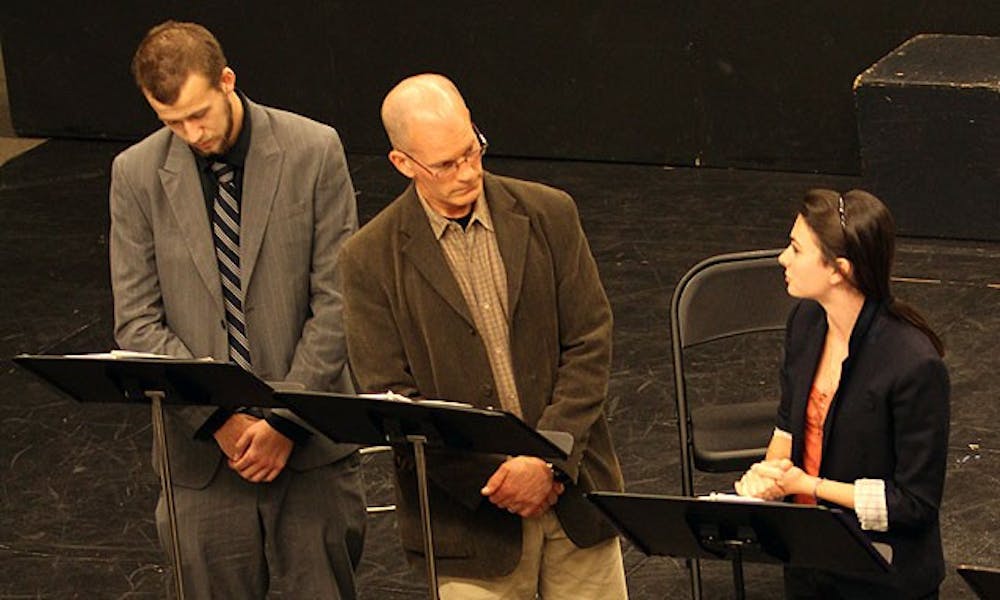More than 50 years ago, Rosalind Franklin made the invisible visible, but what happened next continues to trouble scientists and fuel artists.
A collaboration between the Department of Theater Studies and the Institute for Genome Sciences and Policy culminated in a staged reading of Anna Ziegler’s recent play “Photograph 51,” Monday night. The play dramatizes the race to discover the structure of DNA and exposes the barriers faced by Franklin, who as a Jewish woman fought against institutionalized sexism and anti-Semitism to gain acceptance in the scientific community.
Photograph 51, the image from which the play takes its name, is the best image Franklin produced through X-ray crystallography of DNA molecules. Without her consent, Franklin’s research partner Maurice Wilkins showed the image to James Watson, a rival researcher who raced back to his colleague Francis Crick and created the first correct double-helix model of DNA. The three won the Nobel Prize. Franklin died of ovarian cancer and was thus ineligible.
Ziegler, who lives in Brooklyn, spent her day speaking to theatre studies classes, visiting with students in the Genomes in Our Lives Focus cluster, and touring Duke’s campus. It was, she said, a very busy day.
“It’s really fun to have your play on a syllabus next to [James Watson’s] ‘The Double Helix,’” she said. “The cross-departmental cooperation that made this happen is really phenomenal.”
Dan Kiehart, chair of the biology department, was in the audience to watch two of his students act—sophomore Sam Kebede and junior Garret Ruhland, as Watson and Crick respectively. He said the play gave a fair and largely accurate account of the obstacles facing women in science during Franklin’s time.
“[Franklin] was presented as both a victim of her times and also, to a certain extent, a bit edgy,” he said. “Even if things weren’t as bad as the play suggests, [the field] was still ludicrously biased.”
He also said the play’s focus on relationships and betrayal between researchers speaks to larger truths about the scientific community.
“Science is a very intimate business where trust is so important,” he said. “When you fail to establish a really close trust, it’s a big loss.”
Heather Wiese, Trinity ’11, now a Secondary Teacher Preparation candidate, was a double major in math and theater. She said the play was an excellent fusion of science and drama.
“You don’t have to understand the science behind what they are saying to appreciate the play, but if you do it’s the icing on the cake,” she said.
Jay O’Berski, assistant professor of the practice of theater studies, directed a small group of undergraduates, graduates, faculty, and visiting alumni in the staged reading. He said the day’s events, including the reading, resulted from the coordination and influence of Dr. Robert Cook-Deegan, director of the Duke Institute for Genome Science and Policy’s Center for Genome Ethics, Law and Policy.
Cook-Deegan’s first encounter with the play was a review published in the journal Nature, which he read on a flight to New York last October.
“I was giving a talk at Columbia, but I was able to snag a last-minute ticket to the show,” he said. “I ran across town after the talk, caught the show and really, really liked it.”
Having determined to bring the production to Duke, he turned to a former student, Alessa Colaianni, Trinity ’07, who played Franklin in the reading. Now a second year medical student at the Johns Hopkins University School of Medicine, Colaianni was a double major in biology and philosophy at Duke, and paired independent study projects on the history of recombinant DNA with frequent work in improv theatre. Cook-Deegan said he immediately thought of Colaianni after seeing “Photograph 51.”
“I called Alessa and told her that I wanted to bring this play to Duke. She got in touch with Jay, I talked to my colleagues at the Institute, and we were able to make it happen,” he said.
Colaianni said she was excited to participate in the reading and happy to visit her former professors at Duke.
“Obviously, the role of women in science has changed a lot and for the better [since the early 1950s],” she said.
Ziegler said she is currently working on a screenplay adaptation of Photograph 51. The film will be produced by Darren Aronofsky and Rachel Weisz.
Get The Chronicle straight to your inbox
Signup for our weekly newsletter. Cancel at any time.

